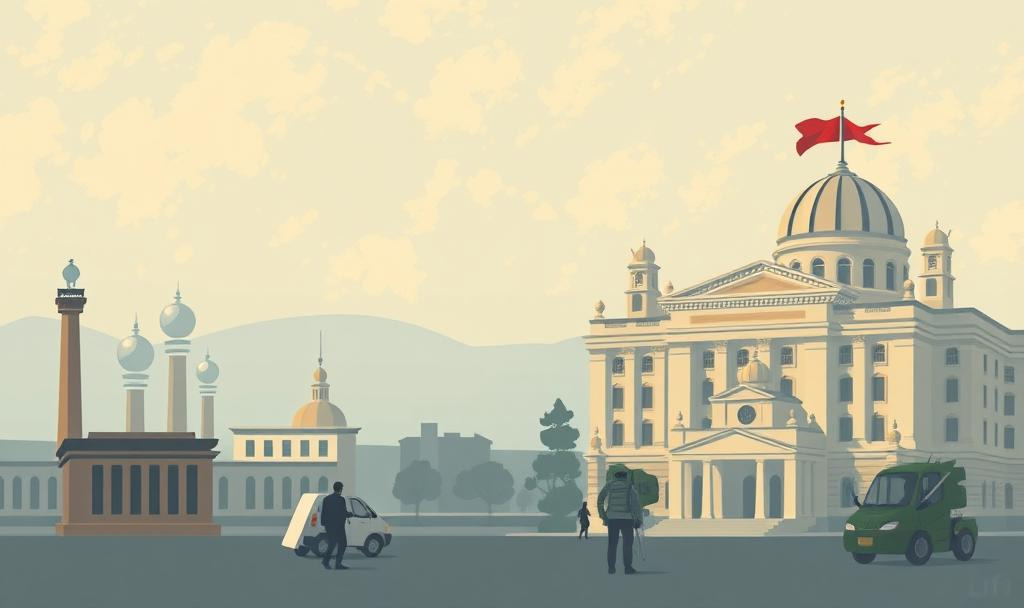What Is Wrong with Economic Theories of Political Order? A Different Perspective
The problem is not that there is too little competition. The problem is that there is no independent referee.
By all appearances, the modern state is a rational actor, responding to costs, benefits, incentives, and competition like any other player in the marketplace. From this assumption flows a dominant intellectual orthodoxy: that political order can best be understood—and improved—through economic reasoning. But this view, seductive in its simplicity, is not only analytically flawed, it is politically dangerous as well.
Several influential schools of thought—structural realism, anarcho-capitalism, and anarcho-socialism, among others—have taken up this economic lens to theorize political order. Though they differ widely in ideology and policy prescriptions, they share a common foundation: all treat the state as if it were a profit-maximizing firm—a for-profit organization (FPO)—best disciplined by the forces of competition. This analogy may offer some useful metaphors—but it collapses under scrutiny.
Structural Realism: States as Rational Profit Maximizers
Structural realism, a dominant theory in international relations, assumes that the international system is anarchical—no central authority exists above states. Within this system, states act like firms in a competitive market, seeking to survive and maximize relative power. The theory predicts that states will balance against threats, form alliances, and engage in conflict when necessary to maintain their market share.
But what if the analogy is mistaken at its core? States are not corporations. Their leaders are not CEOs, and their citizens are not shareholders. Nor do states exist to maximize "power" in the same way firms seek profits. This metaphor, while elegant, obscures the moral and institutional function of the state as guardian—not competitor—in the social contract.
Anarcho-Capitalism: Markets Will Govern Better
Anarcho-capitalists go farther. They argue that the state itself is the problem. Political order, they say, can emerge through private markets for law, defense, and arbitration. Just as competition disciplines inefficient firms, so too will market competition discipline private providers of governance.
This vision imagines the state as one giant inefficient monopoly—an FPO ripe for disruption. But here again, the metaphor misleads. The state is not a firm competing in a marketplace—it is (or ought to be) a nonprofit institution that manages and oversees public life. Its goal is not profit but justice, not competition but fairness. Strip away the oversight mechanisms, and you don’t get a freer society—you get a captured one, where private actors become unaccountable feudal lords, arbitrating rules for profit.
Anarcho-Socialism: The Cooperative State
On the other end of the spectrum, anarcho-socialists also reject the state—but from a different angle. They see it not as a monopolistic firm but as an instrument of capitalist exploitation. Their alternative is a decentralized system of self-managing communes and worker cooperatives.
While more realistic, this theory still operates within the same flawed market logic. It assumes that, once liberated from hierarchy, people will coordinate political life through horizontal networks, much like mutual aid or non-hierarchical enterprises. Yet even these networks require rules, enforcement, and long-term legitimacy—functions the state traditionally provides. Without oversight, even the most well-meaning NPOs collapse into clientelism, capture, and self-dealing.
The Deeper Error: Misunderstanding the Nature of the State
The foundational flaw in all these theories is their treatment of the state as a for-profit organization that can be disciplined through competition alone. But in theory—and in law—the state is a nonprofit organization (NPO). Its leaders are trustees, not owners; its resources belong to the public, not to insiders.
And what happens when nonprofit institutions lack oversight? They do not become more accountable. They become more corrupt. Without transparent checks, trustees begin acting like shareholders—disbursing public resources to themselves, their families, and their allies. Political office becomes a form of private property.
This is not a speculative concern. Plato foresaw it millennia ago:
“Whenever [the guardians] possess private land, houses, and currency, they'll be householders and farmers instead of guardians, and they'll become masters and enemies instead of allies of the other citizens.”
The tragedy of political life is not that states fail to compete. It is that they fail to remain nonprofit. Oversight—not market pressure—is what prevents states from degenerating into mafia-style kleptocracies. The problem is not that there is too little competition. The problem is that there is no independent referee.
Economic Theories Begin with a Perverted State
All economic theories of political order make the same mistake: they begin with a perverted state and then expect it to self-correct. But if decision-makers already see themselves as owners—rather than stewards—no amount of market logic will fix the problem. You don’t ask the fox to guard the henhouse and then hope competition with other foxes will keep it honest.
Instead, we must remember what the state is supposed to be: an impartial, nonprofit guardian of the common good, rigorously overseen by institutions designed to detect and correct dysfunction. Until our theories reflect this truth, they will continue to generate policies that enable—rather than restrain—the privatization of political power.




This is a good article but does not take into consideration of the power of capital over the state. Local governments are in competition with each other for investment and wealthy residents because of capital mobility. Local governments need growth, jobs, and an expanding tax base.
If you would like some resources on this subject I have plenty.
https://peioi.substack.com/p/competition-vs-democracy-bc7